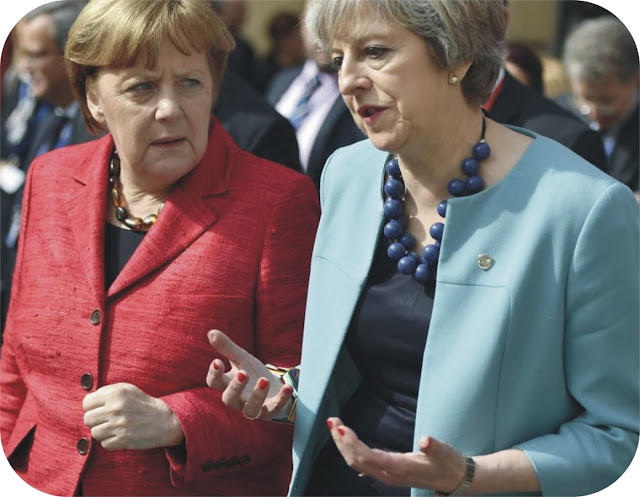German Chancellor, Angela Merkel has
warned the British Prime Minister about undercutting tax in order to lure
companies into the UK, saying that taxes are the price being paid for a just
society. The warning was issued out during her meeting with Merkel in EU summit
in Malta.
Merkel reiterated to Mrs May that
Germany had no plan of going into tax tussle with Britain, as she said “We have
a tax system in Germany that has weathered challenges well. I see no reason for
entering a race for who has the lowest corporation tax,” she said.
“We need tax revenues, we need a
fair tax system, in order to make necessary investments in our society.”
Merkel’s warning came as leaders
of the European Union, expressed their anger against President Trump’s
perceived hostility to the union, and told Mrs May that her offer to bridge
between the union and Trump was not welcomed in any way, supporting NATO in
particular.
It appears the lion’s tail
regarding tax was step on, when the PM said she would “change the basis of
Britain’s economic model” at the EU summit in Malta, if she does not get her
way in the Brexit negotiations.
The EU leaders unanimously saw
the PM’s threat to make Britain an offshore enemy to the EU, slashing taxes and
regulations in order to lure reluctant foreign investment.
Though corporate taxes in the UK
is about to crash to 17%, which is still below the EU average.
But such an attempt would
drastically reduce government revenues, which will further make funding the NHS
and public schools more difficult.
Involuntary statement was later made
by Downing Street as it denied a snub after an official post-lunch chats
between the pair – which was to be a highlight of the summit – were annulled inexplicably,
saying that every aspect was covered during their short walkout.
The German Chancellor expressed
how content she was when the PM said she look forward to seeing a “strong EU”,
even after Britain had left.
Merkel also backed Ms May’s call
for EU countries to spend more on defence, in return for what the Prime
Minister has claimed is Mr Trump’s “100 per cent” commitment to Nato.
“We need to invest more in our
defensive capabilities,” said Ms Merkel.
“There was a very clear
commitment around the table towards Nato – and the American administration,
meanwhile, has also come out with this commitment.”
Furthermore, Downing Street stated
how the PM, over lunch in Malta, brought up her recent chats with President
Trump, “urging other EU leaders to work patiently and constructively with a
friend and ally”.
According to a spokeswoman: “She
said that the alternative – division and confrontation – would only embolden
those who would do us harm, wherever they may be.”
Earlier on, other EU leaders had
rebuffed the Prime Minister's offer to be a “bridge” to the President, with
French President François Hollande saying: “It is not about asking one
particular country, be it the UK or any other, to represent Europe in its
relationship with the United States.”
In the meantime, Dalia
Grybauskaite, the Lithuanian President, gave a mocking verdict, saying: “I
don't think there is a necessity for a bridge – we communicate with the
Americans on Twitter.”
On the other hand, European
Council President Donald Tusk was appeasing about Mr Trump, saying: “What we
need is as strong transatlantic friendship and relations as possible, and the
UK can, inside Europe or outside Europe, the EU not Europe, can be very
helpful.”
Interestingly, Ms May’s hopes for
an early deal on the rights of British citizens living in the EU after Brexit
were also given a boost, when Spain's Prime Minister Mariano Rajoy agreed one
was needed.
Yet, Ms May’s scheme to go to the
summit flaunting her rebellion in meeting Mr Trump first – ostensibly hoping to
strengthen her hand in the Brexit talks – seemed to have backfired.
She carried the message from the
new President that Europe must increase its defence spending in return for his
“100 per cent” commitment to Nato.
But then other EU leaders view
the American leader with dismay because of his hostility to the EU, his
protectionism and controversial policies such as the travel ban from seven
mainly Muslim countries.
French President Mr Hollande
openly terminated the idea of Britain as a bridge, pointing to Mr Trump’s
welcoming of Brexit and insisting he should “not get involved”.
According to Hollande: “He may
have his own views, but it is up to Europe to decide how many members there
should be, and who should leave.”
And Joseph Muscat, the Prime
Minister of Malta – which holds the six-month presidency of the European
Council – said it was time for the EU to “lead at a global level”.
He stated that “We cannot stay
silent where there are principles involved. As in any good relationship, we
will speak very clearly where we think that those principles are being trampled
on.”
Tim Farron, the Liberal Democrat
leader, ridiculed Downing Street’s insistence that Ms May and Ms Merkel had
discussed all they needed to.
“I cannot imagine Theresa May
seriously thinks a bit of polite chit-chat through the streets of Valletta
replaces a serious bilateral meeting,” he said.
To add to the sense of her
isolation – and in a signpost to the future – Ms May left the Maltese capital
early, leaving the other leaders to continue the summit without her.











No comments:
Write comments